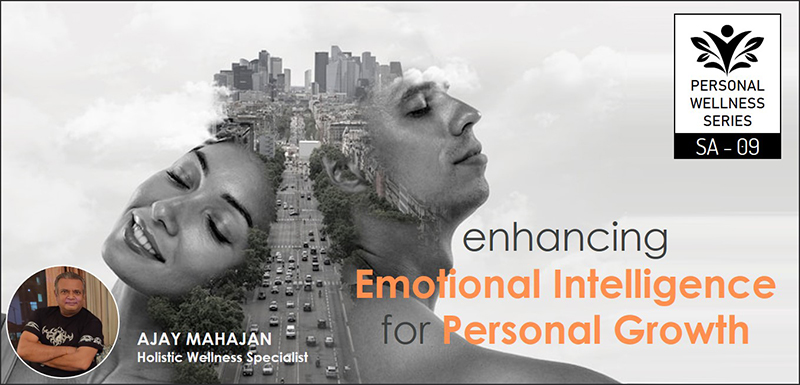
In the journey of personal wellbeing and growth, emotional intelligence stands as a guiding light, illuminating the path to self-awareness, empathy, and meaningful connections.
Defined as the ability to recognize, understand, and manage our own emotions while effectively engaging with the emotions of others, emotional intelligence (EI) is a key factor in determining one’s personal and professional success.
In this comprehensive exploration, let us delve into the intricacies of emotional intelligence, understand its components, and uncover actionable strategies to enhance it for transformative personal growth.
Understanding Emotional Intelligence
- The Components of Emotional Intelligence
- Self-Awareness: Recognizing and understanding one’s own emotions.
- Self-Regulation: Managing and controlling one’s own emotions in various situations.
- Motivation: Channeling emotions to achieve goals and maintaining a positive outlook.
- Empathy: Understanding and sharing the feelings of others.
- Social Skills: Effectively navigating social situations and building meaningful connections.
- The Impact of Emotional Intelligence
- Enhanced Communication: Improved ability to express oneself and understand others.
- Effective Leadership: Leaders with high EI can navigate complex interpersonal dynamics and inspire their teams.
- Conflict Resolution: The ability to handle conflicts constructively and find resolutions.
- Stress Management: EI contributes to resilience and coping with stress.
- Healthy Relationships: Building and maintaining meaningful relationships.
Assessing Your Current Emotional Intelligence
- Self-Reflection
- Journaling: Maintain a journal to reflect on your emotional responses and patterns.
- Feedback: Seek feedback from trusted friends or colleagues about your interpersonal skills.
- Utilize Assessments
- Emotional Intelligence Tests: Various validated tests are available to assess your current level of emotional intelligence.
- 360-Degree Feedback: Gather feedback from peers, subordinates, and supervisors for a comprehensive view.
Strategies for Enhancing Emotional Intelligence
1. Cultivate Self-Awareness
- Mindfulness Practices: Engage in mindfulness meditation to develop awareness of your thoughts and emotions.
- Journaling: Regularly journal your emotions, triggers, and reactions to gain insights into patterns.
2. Develop Self-Regulation Skills
- Pause and Reflect: When faced with strong emotions, take a moment to pause and reflect before responding.
- Stress Management Techniques: Practice stress-reduction techniques like deep breathing or progressive muscle relaxation.
3. Foster Intrinsic Motivation
- Set Meaningful Goals: Align your goals with your values to foster intrinsic motivation.
- Celebrate Achievements: Acknowledge and celebrate small and large accomplishments to stay motivated.
4. Cultivate Empathy
- Active Listening: Practice active listening to truly understand others’ perspectives.
- Put Yourself in Others’ Shoes: Regularly try to understand situations from others’ viewpoints.
5. Develop Social Skills
- Effective Communication: Hone your communication skills, both verbal and non-verbal.
- Conflict Resolution Training: Learn and practice strategies for resolving conflicts peacefully.
Emotional Intelligence in Relationships
- Romantic Relationships
- Open Communication: Foster open and honest communication with your partner.
- Emotional Support: Provide and seek emotional support in times of need.
- Family Dynamics
- Understanding Differences: Embrace and appreciate the diversity within your family.
- Constructive Conflict Resolution: Learn to navigate family conflicts with empathy and understanding.
- Professional Relationships
- Leadership with EI: Effective leaders inspire trust and collaboration through high emotional intelligence.
- Team Dynamics: Foster a positive team culture by promoting emotional intelligence within the team.
Overcoming Challenges in Developing Emotional Intelligence
- Fear of Vulnerability
- Normalize Vulnerability: Understand that vulnerability is a strength, not a weakness.
- Gradual Exposure: Take small steps to share your thoughts and feelings, gradually increasing your comfort level.
- Managing Criticism
- Separate Feedback from Identity: Recognize feedback is about behaviour, not your worth.
- Seek Constructive Feedback: Encourage feedback that provides insights into areas for improvement.
- Dealing with Overwhelming Emotions
- Grounding Techniques: Practice grounding techniques, such as focusing on your breath or a specific object, to manage overwhelming emotions.
- Professional Help: Consider seeking the guidance of a therapist or counsellor for additional support.
Integrating Emotional Intelligence into Everyday Life
- Morning Reflection
- Check-In with Emotions: Begin each day by briefly reflecting on your current emotional state.
- Set Positive Intentions: Establish positive intentions for the day to guide your emotional responses.
- Regular Check-Ins
- Daily Emotional Check-Ins: Take a few moments throughout the day to check in with your emotions.
- Journaling: Maintain a gratitude journal to focus on the positive aspects of your day.
- Mindful Practices
- Mindful Breathing: Incorporate mindful breathing exercises into your routine for moments of calm.
- Mindful Eating: Practice mindful eating to connect with your senses and emotions during meals.
Seeking Ongoing Growth
- Lifelong Learning
- Read Widely: Explore books and articles on emotional intelligence and related topics.
- Attend Workshops and Seminars: Participate in workshops or seminars to deepen your understanding and practice.
- Peer Learning
- Peer Support Groups: Join or create a peer support group focused on enhancing emotional intelligence.
- Accountability Partners: Partner with someone who shares the goal of developing emotional intelligence for mutual support.
Conclusion
Emotional intelligence is not a static trait but a dynamic skill that can be nurtured and developed throughout life. By embracing self-awareness, regulating emotions, and fostering empathetic connections, you embark on a journey of profound personal growth.
Remember, the art of enhancing emotional intelligence is a lifelong process, and each step forward brings you closer to a more fulfilling, connected, and emotionally intelligent version of yourself.
Through intentional practice and a commitment to continuous learning, you can sculpt a life rich in self-awareness, meaningful relationships, and boundless personal growth.
Ajay Mahajan | +91 96548 89815 | ajm@ajaymahajan.info
